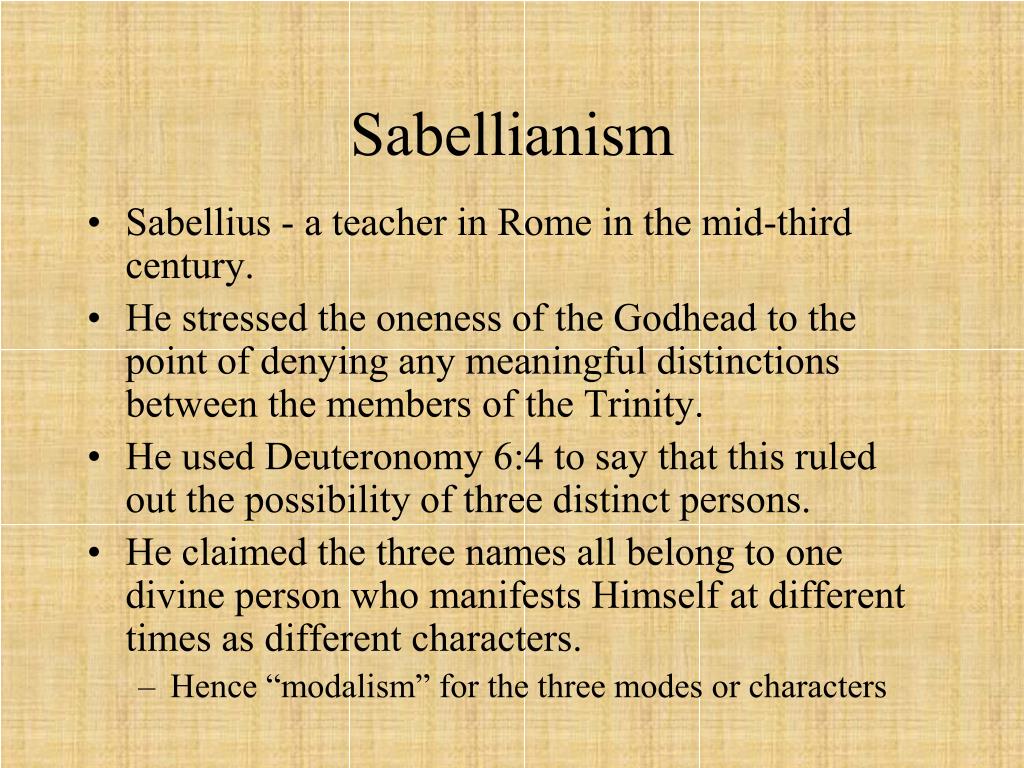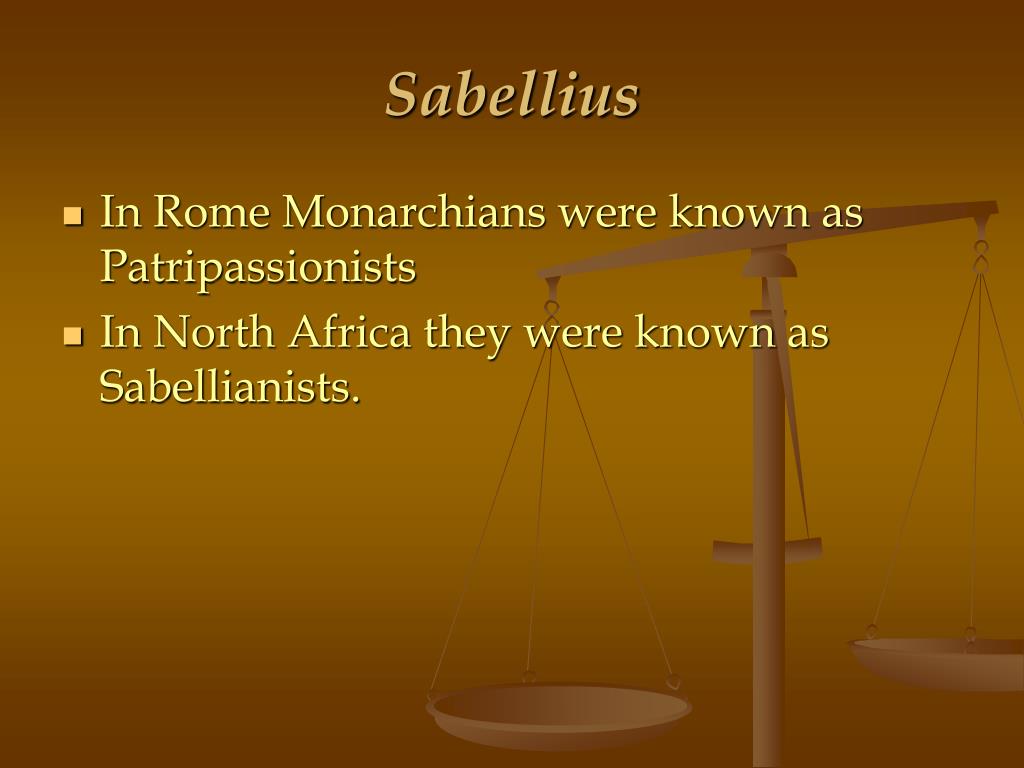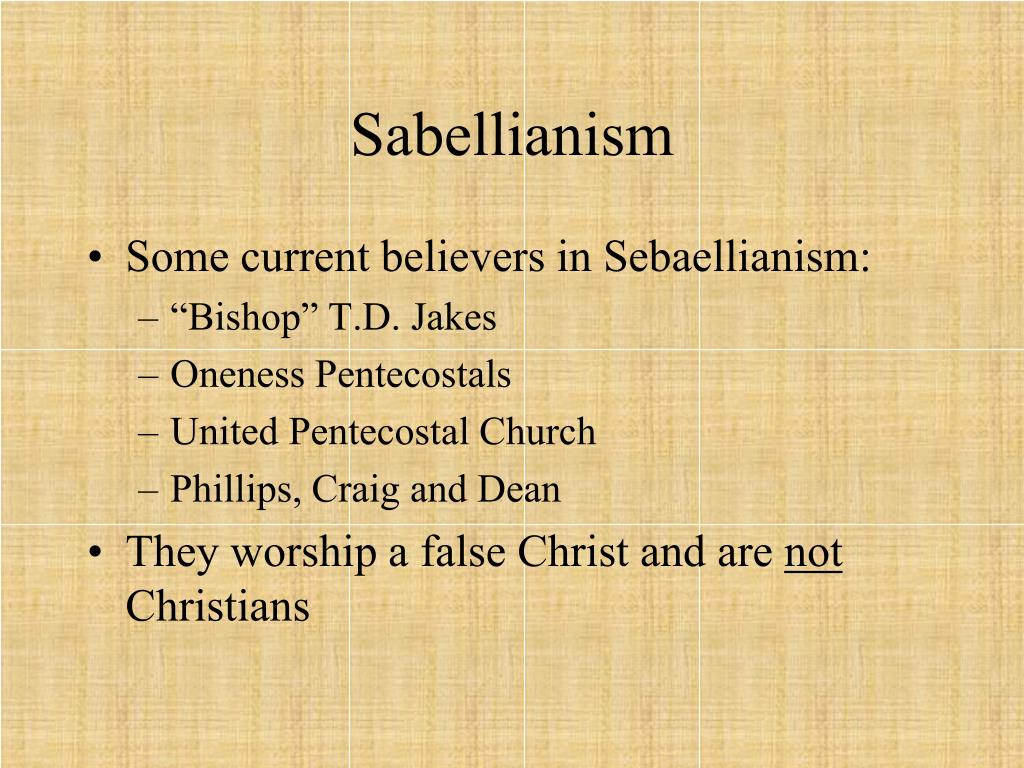
New World Translation Defended The Sabellianism of John 11
Sabellianism. In Christianity, Sabellianism is the belief that God the Father, God the Son and the Holy Spirit are three modes or aspects of God. Once popular but later declared heretical, Sabellianism and similar theologies developed out of the earlier teaching know as Modalistic Monarchianism, with which it is often identified.

Sabellianism Stuff You Missed in Sunday School
Sabellianism. In Christian theology, Sabellianism is the belief that there is only one Person ('hypostasis' in the Greek language of the fourth century Arian Controversy) in the Godhead. For example, Hanson defines Sabellianism as the "refusal to acknowledge the distinct existence of the Persons" and "Eustathius was condemned for Sabellianism.

Sabellianism in the Eastern church or Patripassianism in the Western church (also known as
Sabellius (fl. ca. 215) was a third-century priest and theologian who most likely taught in Rome, but may have been a North African from Libya. Basil and others call him a Libyan from Pentapolis, but this seems to rest on the fact that Pentapolis was a place where the teachings of Sabellius thrived, according to Dionysius of Alexandria, c. 260. What is known of Sabellius is drawn mostly from.

Sabellianism Medenilla, Pearl M. BSBABM2 PDF Arianism Conceptions Of God
Sabellianism is an unbiblical denial of the eternal distinctions among the Persons of the Trinity. On one level, it is easy to see why Sabellianism has been so popular throughout the centuries—it is certainly much easier to understand Sabellianism than it is to understand the biblical doctrine of the Trinity. However, the Bible presents God.

Shield of the Trinity Triquetra God Sabellianism celtic Celtic symbols, Triquetra, Trinity
Sabellianism It was an early Trinitarian heresy that exaggerated the oneness of the Father and the Son (John 10:30). It was promoted by Sabellius in Rome during the early third century.

L'HÉRÉSIE DU SABELLIANISME
Sabellianism is a trinitarian heresy. It stresses that God, as the one divine subject, stands above or behind three modes of appearance in his relation to the world. The first recorded proponent of this view was Noetus of Smyrna, a monk who preached a form of this doctrine in the 2nd century. The view takes its name, however, from Sabellius, a.

The Feast of the Holy Trinity, The First Sunday after Pentecost, 7 June 2020
Sabellianism was rejected by the ecumenical councils of Nicaea, Constantinople, Ephesus, and Chalcedon. According to the modalistic view, the one true God does not exist as three distinct, transcendent, immanent, infinite, eternal, and immutable persons: God the Father, God the Son and God the Holy Spirit. Instead, there is only one person in.

PPT Systematic Theology by Wayne Grudem PowerPoint Presentation, free download ID7037860
Sabellianism. Sabelianism is a position in Christian theology. It is against the idea of the trinity. Sabellianism is also known as modalism, modalistic monarchianism, or modal monarchism. Basically, the teaching says that God has three masks, and humans see him in three different ways, but he is in fact only one.

PPT The History of Christian Doctrine PowerPoint Presentation, free download ID688833
founding of Sabellianism. In Sabellianism. Monarchianism); it was propounded by Sabellius (fl. c. 217- c. 220), who was possibly a presbyter in Rome. Little is actually known of his life because the most detailed information about him was contained in the prejudiced reports of his contemporary, Hippolytus, an anti-Monarchian Roman theologian.

PPT Systematic Theology by Wayne Grudem PowerPoint Presentation, free download ID7037860
SABELLIANISM A trinitarian heresy, named after one of its proponents, the heretic Sabellius (fl. c. 220), and theologically defined by the terms monarchianism or modalism, the latter term devised by A. von Harnack. It consists in so emphasizing the unity of the Divine Being as to deny that the Son has a subsistence (or personality) distinct from that of the Father.

Dionysius of Rome led the fight against Sabellianism in the mid third Century. This
Sabellianism emphasized the fact that God is one, wrongly concluding that in the Godhead there is a single (mon-) principle or rule (-arche). Thus the heresy was also called "Monarchianism.". Sabellians explained their position by saying that the Father, the Son, and the Holy Spirit are not three Persons, but three functions or modes of a.

What is Sabellianism?
Sabellianism, Christian heresy that was a more developed and less naive form of Modalistic Monarchianism ( see Monarchianism ); it was propounded by Sabellius (fl. c. 217- c. 220), who was possibly a presbyter in Rome. Little is actually known of his life because the most detailed information about him was contained in the prejudiced reports.

PPT Systematic Theology by Wayne Grudem PowerPoint Presentation, free download ID7037860
21. Biblically the biggest problem with modalism is that you end up having God talking to himself several times in the NT. The idea of modalism is simple enough - God has different "modes" of being, kind of like an actor who simply appears with different masks in different situations [1]. If the same person is merely appearing in multiple forms.

Know Your Heresies Sabellianism
Modalism. Modalism, also called Sabellianism, is the unorthodox belief that God is one person who has revealed himself in three forms or modes in contrast to the Trinitarian doctrine where God is one being eternally existing in three persons. According to Modalism, during the incarnation, Jesus was simply God acting in one mode or role, and the Holy Spirit at Pentecost was God acting in a.

Historical Christian Heresies
Sabellius. (c. A.D. 215) He was an early Christian theologian who taught that God is indivisible so the Father, Son and Holy Spirit are simply different manifestations or modes of the same entity. This view of the trinity was condemned, holding instead that the three members of the godhead were distinct beings yet were one in purpose and essence.

Sabellianism
Sabellianism is named after Sabellius, a Christian priest from the third century CE.He argued that God was made of one substance that could manifest in different ways. Very little is known about.